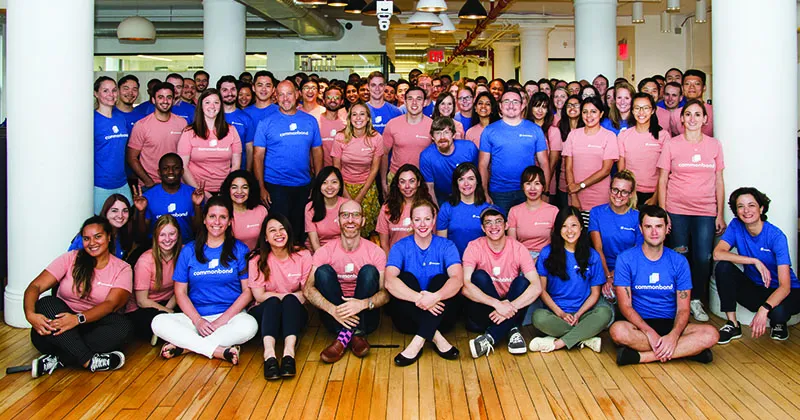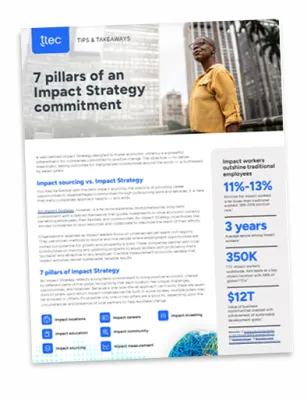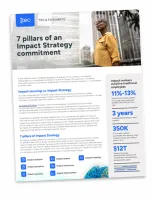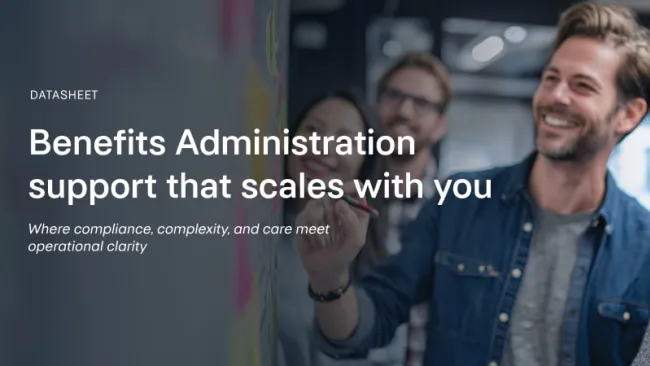In today’s job market, what constitutes an engaging employee experience is constantly redefined. There was a time where a fun lounge area with games and snacks was viewed as a key factor in retaining employees. But look at Google. For all its hip attempts to create a fun work environment, it has one of the lowest median employee tenures at little over a year, according to PayScale.
“If employees aren’t engaged and satisfied at work, they’ll move on to the next best opportunity to advance their career or better fit their lifestyle,” says Sarah Stoddard, a community expert at Glassdoor. “As such, an unsatisfied workforce can negatively impact a company’s bottom line as they spend more time and money to recruit, hire, and train new employees.”
The American workforce is increasingly demanding that employers provide meaningful benefits to retain their skill and time.
Aetna invests in mindfulness
Over the last decade, health insurance firm Aetna has sought out a healthier and more impactful employee experience with the introduction of mindfulness. The mindfulness program, in which over 20,000 Aetna employees participate, has shown that a great employee experience can be in the moment and developed into a passion.
Cheryl Jones, director of mindfulness at Aetna, defines it as paying attention to the present moment with an attitude of openness and curiosity. It functions under the bigger umbrella of wellness as a way to encourage healthier habits and outlooks on life. “Mindfulness empowers people with a way to navigate our fast-paced and overloaded modern life and experience more joyful moments at work,” says Jones.
Jones, alongside Andy Lee, chief mindfulness officer, and Cheryl DuBois, a senior project manager and mindfulness advocate, have guided a journey of well-being that was led by Aetna’s former CEO Mark Bertolini, a champion of living in the moment. Bertolini, who suffered a life-threatening skiing accident in 2004, has long been a prominent voice in promoting mindfulness and meditation as a path to self-betterment. In 2008, Bertolini spurred an internal study at Aetna to see the effects of mindfulness on employees. It discovered that mindfulness helped reduce stress, improve sleep, and better manage physical pain.
Not to be limited only to meditation, Jones described in a blog how mindfulness can be associated into everyday work by breathing to clear one’s mind before calls, avoiding multitasking, and carefully considering what one may send in an email. “When we are practicing mindfulness, we are aware of breathing, thoughts, feelings, sensations, and surroundings,” she explains.
Participants are paying attention to all of this whenever they pause and tune in to the present moment during the workday.
Empowering values
To accommodate its large employee population, the Aetna mindfulness initiatives are made available to all employees through a variety of platforms. This can range from videos and audio practices on the internal website, to newsletters, blogs, and a streamed speaker series with external experts.
In 2017, the healthcare company made a significant leap in its mindfulness program by opening its first Mindfulness Center at its headquarters in Hartford, Conn. The center aims to be a space employees can visit to collect and calm themselves, participate in weekly activities, and learn from speakers. Employees outside the center are able to join many of its functions virtually.
It’s part of an effort to make mindfulness values and practices available to anyone who’s interested, regardless of their location. An effective employee benefits program needs to be inclusive and easy to reach for all locations, says Jones, especially if it wants to inspire adoption of mindfulness to create workplace well-being.

According to a survey by Thompson Online Benefits, 81 percent of employees who have easier access to their benefits said they feel more loyal to their employer and 77 percent who better understand what they are offered see themselves staying with their employer.
One of the biggest strides Aetna takes to encourage mindfulness is its mindfulness advocate program. Jones describes it as a training program for colleagues who want to become leaders of mindfulness in their workspace. Advocates can help build awareness of the principles and benefits of mindfulness as well as lead practices. An employee becoming an advocate at Aetna is not an official title, but instead a pursuit of their passion and values at the company.
“People want to work for a company that has clearly defined its core values,” Jones says. “When leaders endorse mindfulness, employees are more likely to give themselves permission to practice it during the workday. Over time, this impacts how people ‘show up’ for work and transforms workplace culture.”
Many findings have pointed out that a large majority of employees do not fully understand the core values of their company. According to a study by Gallup, only 27 percent of U.S employees believe in their company values, while only 23 percent can apply those values to every workday.
Mindful results for Aetna
Getting employees to actively participate in a program that coincides with a company’s beliefs can be a tough initiative for even the biggest of brands. The high involvement rate in several of Aetna’s mindfulness programs is a testament to the decade of work they have put into building a healthy workplace culture that employees would choose to be a part of, Jones says.
For the last four years, Aetna has hosted the Mindfulness Challenge, a four-week series of mindfulness topics, with new topics every year for employees to engage and learn from, including how mindfulness improves resilience, energy, and focus, and how it can impact physical health, emotional well-being, and social connection.
Despite the name “challenge,” there is no award at the end. It’s the journey that counts.
“We had over 8,000 people participate last year with no incentive,” says Jones. “We believe the prize is well-being, that you actually feel good from doing this. That’s your prize!”
Additional results from the 2018 Mindfulness Challenge included an 18 percent reduction in stress, 4 percent increase in the corporate employee engagement survey results, and an 87 percent employee recommendation rate.
Employee mindfulness is more than a passing fad
Aetna’s origins in the mindfulness space has been a push not just toward profits, but also to creating and engaging a positive space that encourages employee retention in the workplace.
Unique Employee Retention Programs
Student loan benefits
Paying off a student loan debt is a stressful, expensive, and long-lasting financial impact that affects employees well after their education. Findings from a Make Lemonade report show that there are more than
44 million borrowers in the U.S. who owe more than $1.5 trillion in student debt.
Companies have begun to recognize the financial and mental burden of paying off student debt and are creating benefits that help it pay off during a career.
“By offering student loan benefits, companies have a way not only to bring in the best talent, but also to make a difference in their employees’ financial lives,” says Tara Fung, vice president of CommonBond for Business, a student loan repayment platform that works with more than 250 companies.
And it’s quickly become a major incentive for employees when searching the job market. Research from CommonBond found that 78 percent of employees with current or future student loan debt want an employer to have this financial benefit.
Additional findings from CommonBond showed that 85 percent of employees who currently have or are planning to have student debt said that they would be more inclined to stay at their current company at least three more years if their employer provided monthly student loan repayment. Also, 41 percent said they would stay until their loans are paid off.
“We see more and more companies taking an active role in improving employees’ financial wellness by reducing their student debt burden,” says Fung. “With student loans increasing in both impact and prevalence among a company’s workforce, many are calling student loan repayment programs the next 401(k) in financial wellness benefits.”

She says that via the platform, companies offer their employees evaluation tools with guidance on educational finance decisions, handling future education costs, and determining the best course of action for handling existing debt. Some even facilitate a percentage of payments directly to an employee’s student loan or 401(k) based on employee contributions toward their student loans.
Paid, paid vacation
Perhaps one of the best ways to keep employees is to keep them away from work, for a short time at least. Employee burnout plagues industries as the lines between work and life become increasingly blurred. Findings from a 2018 Gallup study reported that almost a quarter of employees are burned out very often or always. Additional statistics showed that burned out employees are 2.6 times more likely to leave their employer and 63 percent more likely to take a sick day.
One of the best solutions to battle burnout- and retention-related issues may lie with Denver-based technology company FullContact, which has led an effort to provide one of the best vacation policies in the country.
“After a year of employment with FullContact, employees are offered $7,500 for vacation with the only catch being they must go completely off the grid—no checking work emails, or using Slack, or working on projects,” says Mike Nemeth, vice president of human resources at FullContact. “The $7,500 is in addition to the paid time off.”
In what he describes as a “Paid, Paid Vacation” on the company website, FullContact’s CEO Bart Lorang laid out three basic rules employees must follow:
- You have to go on vacation, or you don’t get the money.
- You must disconnect.
- You can’t work while on vacation.
As Lorang describes in the post, “In today’s world of email, iPhones, Androids, Twitter, Facebook and devices on our person 24×7, we’re always connected. It’s not healthy.”
According to research conducted in 2018 by O.C. Tanner, employees who take a week or longer vacation in the summer led to 65 percent of respondents reporting that they have a stronger desire to work for their employer one year from now.
In reality, not every company’s vacation policy is as generous as FullContact’s, but time away from the hyper connected lifestyle of today’s business world can be a breath of fresh air for tired and overworked employees.














